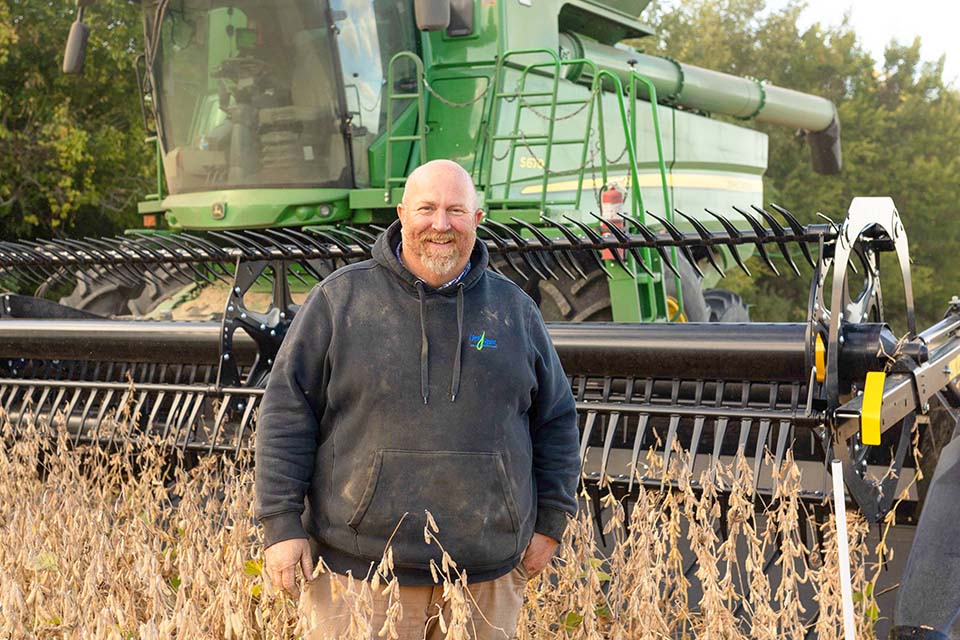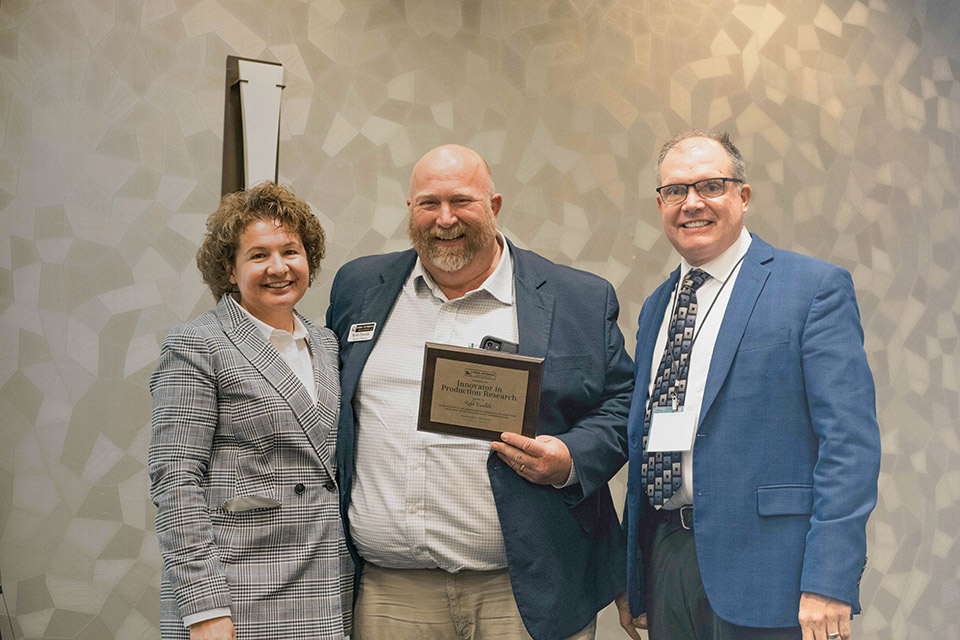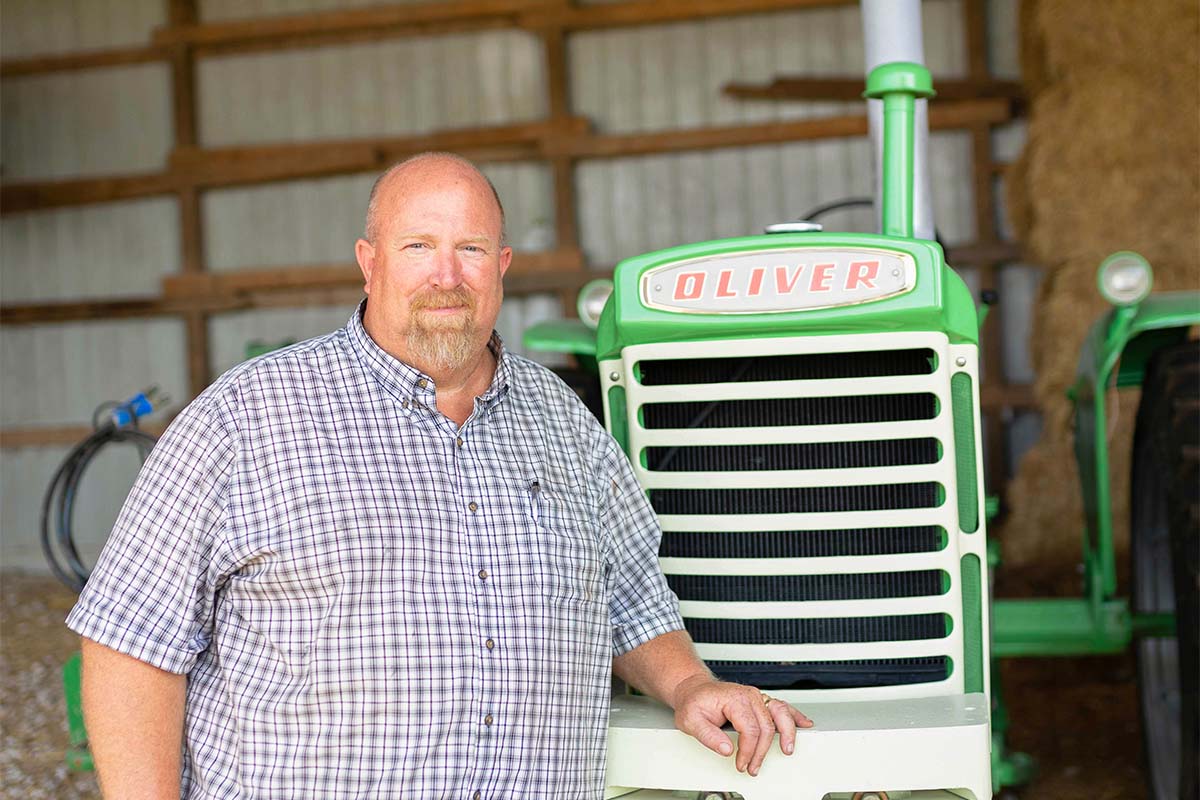
(Photo: Iowa Soybean Association / Joclyn Bushman)
Progress through innovation
October 29, 2024 | Jeff Hutton
Robb Ewoldt shies away from being labeled as an innovator; he just prefers you call him a farmer.
But Ewoldt is both. He has proven over the years that adapting new ideas, new practices and seeking out better ways to improve crop production while also protecting the environment can be profitable. And it’s just good business.
That’s why he was named the 2024 Iowa Soybean Association (ISA) Innovator in Production Research award recipient. The award, sponsored by John Deere, recognizes an individual or organization leading the way in the use of precision agriculture technology and working to discover, validate and manage practices to improve soybean profitability.

Active engagement
In their nomination of the Davenport-area farmer, ISA’s Research Center for Farming Innovation (RCFI), noted that the definition of a true innovator is one that “introduces something new or different.” Ewoldt, they said, expands that definition many steps further because he never gives up until he has found success at what works best for his farm.
Ewoldt is a great proponent of RCFI not only because he’s always willing to participate in new trials and programs but because he works the Plan-Do-Check-Act style of practice.
“By relentlessly experimenting with this approach over time, Robb has found a way to put the two forces of better yield and increasing his bottom line while improving the environment,” the RCFI staff says. “How has he done this — by his ‘Learn-Fail-Fix-Yield’ mentality with no-till, strip-till and cover crops.”
Ewoldt shares what he learns with other farmers and industry experts because he knows it can be beneficial for all Iowa producers.

The next best ideas
His latest endeavor has been the design and implementation of a 15-inch row strip-till toolbar for soybeans.
“We want to grow 15-inch beans, but how do you get the fertilizer in the right spot,” he asks. “So, we came up with this toolbar. And the hypothesis was when we went from no-till to strip corn, we had a 14% jump in yields. My thought was what if we could do that with beans and placing the fertilizer in the root zone. If we could do half of what we did with corn — 7% — that could be a 3-3.5 bushel per acre increase.”
The work on the toolbar has not been easy, however.
“I have a much better respect and understanding for some of the things engineers have done on ag equipment,” he says. “After building this thing, and it certainly didn’t always go as planned, we had to shift, adjust and pivot to make it work.
“I sometimes call it ‘Robb’s folly,’” he laughs.
Ewoldt hopes that this liquid suspension fertilizer bar will allow for greater yields and a greater return on investment.
“I don’t look at this or anything as trying new stuff, but instead I’m just trying to improve,” he says. “I have a motto, ‘produce the most, using the least and with the best practices.’ In other words, we want the highest yields, with the least number of inputs needed, while using the most environmentally-friendly conservation practices known.”
Understanding how new ideas could shape the future is important.
“As we lose ground to urban development, and as the population grows, we need to find better ways to grow more with what we have,” he says. “We always have to be looking at the next best ideas. It’s not about reinventing the wheel but making it better.”
An open mind
Ewoldt, a past ISA president and current director with the United Soybean Board, says farmers and industry leaders must find new ideas that will benefit conservation, water quality and the bottom line.
“Practices over the last 10-15 years have led to more profitability, more yields and a return on investment,” he says. “I’ve set out to try and improve our operation by working on new concepts.”
And Ewoldt is open to new endeavors.
“I’ll listen to anybody — other farmers I respect, the experts, ISA staff and others,” he says. “There are a lot of great ideas out there. Some ideas fit into your operation, some don’t, but you go into it with an open mind.”
Doing the best he can
Ewoldt says he appreciates the recognition, but he refuses to rest on what he’s accomplished on his family farm over the past couple of decades.
Whether it’s been no-till beans, strip-till corn, championing research efforts through trials on his 2,000-acre farm, the veteran farmer believes he’s doing what’s right for his operation.
“The approach is you have to take on new ideas,” he says. “It’s too dangerous to stay complacent, and with a little bit of risk comes great rewards.”
In the end, Ewoldt keeps it simple: “I just want to do the best I can.”
Back